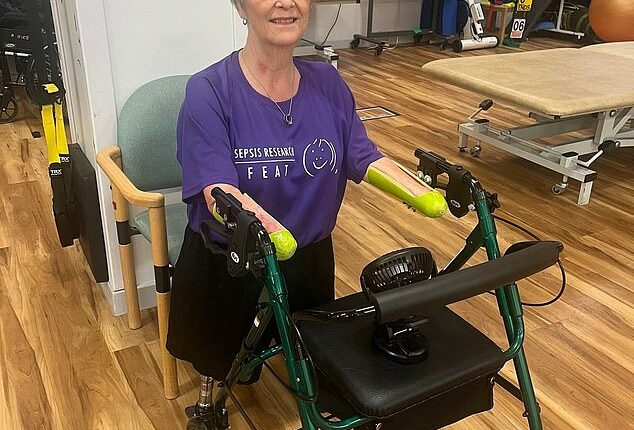A British woman nearly died after contracting an infection that strikes at least 15 million American women annually, leaving her a quadruple amputee.
Kim Smith is now a quadruple amputee, having lost both her hands at the wrists and her legs above the knee after a urinary tract infection went untreated for too long, morphing into life-threatening sepsis.
UTIs are exceedingly common. Around 15 million American women get one every year and more than half of women and about 12 percent of men will experience at least one episode in their lifetime.
Smith has had bladder issues for years, she said, and UTIs were not uncommon for her. They are the result of bacteria entering the urinary tract through the urethra and beginning to spread in the bladder.
Poor hygiene, sexual activity, or even just the anatomy of the urinary tract can give bacteria an easy entry point. Once inside, these microbes attach to the bladder lining, triggering inflammation and the familiar symptoms, including a relentless urge to urinate, burning discomfort, and sometimes cloudy or bloody urine.
Left unchecked, the infection can climb toward the kidneys, turning a mild to moderate pain into a serious health threat.
Smith noticed pain in her lower back while on vacation with her husband. She suspected a UTI was coming, but tried to enjoy her vacation until she woke up one night in agonizing pain.
At the hospital, Smith was placed in a medically-induced coma as a runaway immune response to a standard UTI spiraled into catastrophic damage.

Kim Smith is now a quadruple amputee after a urinary tract infection went untreated for too long and she developed sepsis
Smith and her husband had sought medical care in early 2018 before her body devolved into septic shock. According to Smith, they were turned away by the doctors but given a prescription for antibiotics that the local pharmacy was not able to fill.
The following night, she awoke in pain and struggled to breathe. Her speech was slurred, and she was out of sorts.
As inflammatory chemicals flood the bloodstream, they damage the delicate blood vessels in the lungs, causing fluid to leak into the air sacs, which causes a condition called acute respiratory distress syndrome (ARDS).
This drowns the lungs from within, stiffening them like waterlogged sponges.
At the same time, plummeting blood pressure (septic shock) starves tissues of oxygen, while muscle weakness from acidosis and organ failure makes the physical act of breathing more difficult.
Sepsis also plunges the brain into a state of chaos, causing confusion and speech difficulties.
A storm of inflammatory chemicals can disrupt signaling between brain cells, while liver or kidney failure allows toxins like ammonia to build up, further clouding cognition.
Even when oxygen reaches cells, toxins and mitochondrial dysfunction prevent them from using it. As tissues suffocate, organs fail in a domino effect, starting with the kidneys, then the lungs, which fill with fluid, and then the limbs, which can turn black from gangrene.

When Smith was airlifted back to the UK, her limbs had turned black from the lack of oxygenated blood, forcing doctors to amputate
Without immediate medical attention, widespread oxygen deprivation leads to irreversible damage. Nearly half of septic shock patients progress to multi-organ failure, where survival odds plummet.
When Smith was airlifted back to the UK, her limbs had turned black from the lack of oxygenated blood, forcing doctors to amputate.
‘How I survived, I do not know. It’s a miracle, but I think it’s so that I can warn you and save your life,’ she said.
More than one million patients are hospitalized for sepsis each year, surpassing even heart attack and stroke combined in hospitalization rates.
Those with chronic illnesses, including cancer, kidney disease, or neurological disorders, face especially high risks.
Between one in eight and one in four patients with sepsis will die during hospitalization.
‘I’m here to warn you that if you’ve got any infection at all, don’t think it won’t happen to you because I was fit and healthy and it happened to me. And it could be you. Watch out for symptoms of sepsis,’ Smith said.








